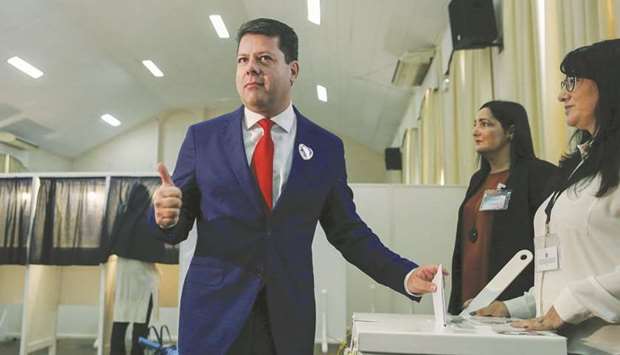Securing an agreement to preserve free movement across Gibraltar’s border with Spain after Brexit comes into effect is “not easy” but is still within reach, chief minister Fabian Picardo has said.
Although Britain and its overseas territories like Gibraltar, a tiny enclave at the southernmost tip of Spain, formally left the European Union on January 31, the transition period to allow both sides to carve out a new relationship ends on December 31.
Parallel talks between Madrid, London and Gibraltar are under way to ensure the flow of cross-border workers and goods between the enclave and Spain after Britain leaves the EU’s single market at the year’s end.
“We are all working extraordinarily hard to secure an agreement. That does not mean that an agreement is easy. But it still remains that which we wish to see happen,” Picardo told AFP in an interview on Wednesday.
Gibraltar imports all of its food and about 15,000 people cross the border from Spain every day to work, accounting for half of the territory’s workforce.
Without a deal in place, Spain-Gibraltar trade would be subjected to tariffs from January 1, slowing the flow of people and goods and causing economic pain on both sides of the border.
“We are working very closely with suppliers outside of Gibraltar to ensure that, if it were necessary, we are able to secure foodstuffs and all materials that we need in order to operate our economy without having associated economic collapse,” Picardo said.
The territory is looking into alternatives to bringing in goods from Spain, such as increasing the supplies shipped in from Britain as well as mulling “a number of different routes”, he said, without giving details.
“The contingency planning is for essentials but life will change radically for the worse if there is not deal — and not just for the people of Gibraltar,” Picardo said.
Spain in 2018 threatened to vote against the term’s of Britain’s withdrawal from the EU unless it got assurances that Madrid would have a strong say on how any post-Brexit treaty with London applied to Gibraltar, which is home to 34,000 people.
Although Spain ceded Gibraltar to Britain in 1713, Madrid has long wanted it back in a thorny dispute that has for decades involved pressure on the frontier.
Tensions peaked in 1969 when the regime of dictator Francisco Franco closed the border which did not fully reopen until 1985.
In 2013, a dispute over an artificial reef in waters claimed by both sides sparked a war of words that triggered months of gridlock at the border after Spain intensified checks, which only ended when Brussels stepped in.
The chief minister reiterated that Gibraltar was considering becoming part of the passport-free Schengen zone as a way of ensuring fluidity of movement on its border with Spain.
“We are looking at a deal that requires the maximum possible level of unrestricted fluidity of people,” he told AFP, saying becoming part of Schengen was just one option.
“We are looking at how we can plug into that mechanism whether it is through having a common travel area with the Schengen member states or some other mechanism that permits this,” he said.
“We want to achieve the same objective, the question is how.”
Britain was never part of Schengen.
If Gibraltar were to join it, the territory would in effect have tighter ties with the EU than when it was part of the bloc.
Picardo dismissed concerns that closer ties with the bloc could over time cause the people of Gibraltar to feel less British.
“The core of who we are, the blood running in our veins and the sentiment that we have is 100% British,” he said.
“And it is not going to be changed by our friendship and our (offering the) hand of friendship to Spain and the European Union on these logistical matters and otherwise important matters.”

Fabian Picardo, Gibraltar’s chief minister poses for photographers as he casts his ballot at a polling station in Gibraltar on October 17, 2019. u201cWe are working very closely with suppliers outside of Gibraltar to ensure that, if it were necessary, we are able to secure foodstuffs and all materials that we need in order to operate our economy without having associated economic collapse,u201d Picardo said yesterday.


